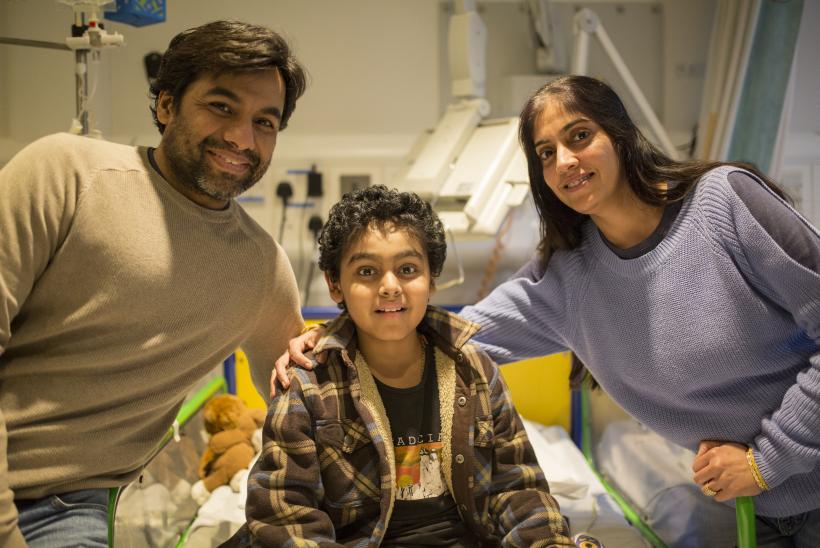GOSH patient first to receive groundbreaking new cancer therapy on the NHS
An 11-year-old boy has become the first NHS patient to receive a pioneering new cancer therapy at Great Ormond Street Hospital (GOSH). Yuvan, from Watford, has relapsed acute lymphoblastic leukaemia (ALL) and has now received the ground-breaking treatment, known as Kymriah.
Kymriah is a type of immunotherapy called CAR-T therapy which modifies a patient’s immune system cells, known as T cells, to attack the cancer cells.
While it will be some time before the results of this treatment are known, the first patient has received the therapy and is currently recovering at GOSH. This treatment has been tested in clinical trials in the US where it has been shown that approximately 50-62% of patients survive without leukaemia for 12 months or more.
Previously, CAR-T therapy was only available to patients as part of research trials. Now, following a landmark deal between NHS England and the manufacturer, the therapy is being offered to eligible NHS patients with relapsed ALL. Research has shown the treatments are effective for patients with particularly aggressive cancers after standard treatments have failed.
Yuvan, a keen cricket fan, was diagnosed with leukaemia in 2014. He unfortunately relapsed after standard treatments and underwent a bone marrow transplant last year. But sadly in October Yuvan relapsed again.
Yuvan’s parents Sapna and Vinay said: “When Yuvan was diagnosed it was the most heart-breaking news we had ever received. We tried to stay hopeful as they say leukaemia in children has 90% cure rate, but sadly, his illness relapsed. This new therapy is our last hope. It means a rebirth to us if this treatment works and we hope it really does. We are so glad that we at least have this new option now. If he had relapsed a year ago it would have been a different story”.
Yuvan said, “I really hope I get better soon so I can visit Lego House in Denmark. I love Lego and am building a big model Bugatti while I’m in hospital.”
ALL affects around 600 people per year, most of whom are children. Although treatments have improved steadily, approximately 10% of patients still relapse.
In November, it was announced that GOSH, along with two other UK hospitals would be the first offer this treatment to NHS patients. Back in November when Yuvan's treatment began, doctors at GOSH collected T-cells, a type of immune cell from his blood. After undergoing a complex laboratory procedure that enabled the T-cells to recognise and kill cancer cells, the T-cells were returned to Yuvan last week.
Dr Sara Ghorashian, Consultant in Paediatric Haematology at GOSH and Yuvan’s doctor said “We are so pleased to be able to offer patients like Yuvan another chance to be cured. While it will be a while before the outcome of this powerful new therapy is known, the treatment has shown very promising results in clinical trials and we are hopeful that it will help”.
Matthew Shaw, Chief Executive of GOSH commented, “GOSH are proud to be one of the first UK sites that will offer CAR-T treatment on the NHS, which recognises the hospital’s world-leading expertise in delivering these innovative therapies to patients as part of clinical trials.”
The availability of the treatment at GOSH follows the success of the CAR-T therapy research programme at GOSH and our partner the UCL Great Ormond Street Institute of Child Health (ICH), which is supported by the National Institute for Health Research (NIHR) GOSH Biomedical Research Centre, GOSH Children’s Charity and many other funders.
As a Research Hospital GOSH has pioneered research into cell therapy and, spear-headed by Prof Persis Amrolia, led one of the first clinical studies of CAR-T therapy for childhood leukaemia in Europe. In 2015, the hospital successfully treated the first patient in the world with gene-edited 'universal' CAR-T cells. Researchers at GOSH are currently exploring the use of 'next generation' CAR-T cells to further reduce the chance of relapse.

